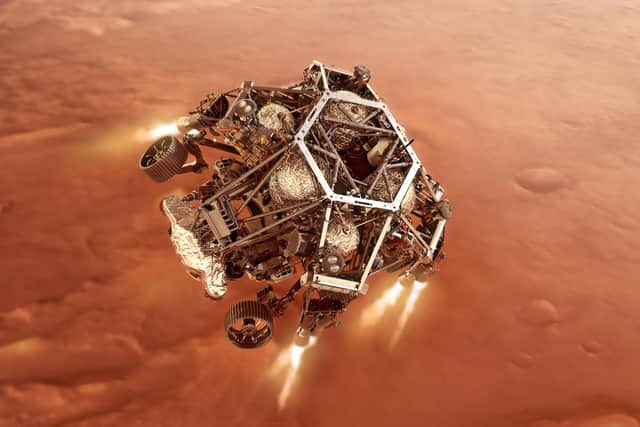Scottish scientist to pilot Mars mission
Dr Christian Schröder is one of five “guest investigators”, joining five scientists from Europe, Russia and Canada, who will play a leading role in commanding the European-Russian ExoMars Rosalind Franklin rover as it launches in September 2022.
Once the rover lands at the selected site of Oxia Planum on Mars in June 2023, the machine will spend a minimum of 211 ‘sols’ (Martian days), equivalent to 230 Earth days, searching for organic carbon molecules that could tell us whether there was ever life on the planet.
Advertisement
Hide AdAdvertisement
Hide AdThe appointment comes months after the launch of the Scottish Space Strategy, which aims to create 20,000 jobs in the sector by 2030. The strategy sets out plans to develop a network of satellite launch sites, pursue green technologies and build on existing strengths in data analysis and research.


Dr Schröder was part of the team operating NASA’s twin Mars exploration rovers, Sprit and Opportunity, from 2003 to 2019. The mission established the past presence of liquid water on the Martian surface – the most important prerequisite for life.
He said: “Over the last two decades we have learned that there was plenty of liquid water on Mars more than 3.5 billion years ago. At that time, Earth and Mars were very similar and life was already well established on Earth.
“So it’s conceivable that there was life on Mars, too. But even if we find the right signs, was that life independent of life on Earth? Or was it the result of meteorite exchange between Earth and Mars?
“If it was independent – and life originated twice within our solar system – then the universe could be swarming with life. If not, that would be less likely.”
A senior lecturer in biological and environmental sciences, Dr Schröder’s expertise spans earth sciences and planetary exploration. He is specifically interested in the interaction between iron minerals and carbon molecules, which can give an indication of the kind of life there might have been.
Once the Rosalind Franklin has landed, Dr Schröder will be based at the Rover Operation Control Centre in Turin, Italy, where the team will guide the rover over the surface of Mars.
The Rosalind Franklin rover is the first to carry a drill long enough to explore molecules up to 2m below the surface, where they would be protected from the harsh radiation on the planet’s surface.
Advertisement
Hide AdAdvertisement
Hide AdThe rover carries nine scientific instruments to locate the best sites for drilling and analyse the retrieved samples. Dr Schröder will be part of the team operating the eyes of the rover – the Panoramic Camera, or PanCam – and the Raman Laser Spectrometer, which identifies minerals and carbon in the drill cores.
He said: “This mission has been in the making for a long time and it will be great to see it finally take off, and significant to be in a leading role when that happens.”
Whilst at the University of Mainz in the early 2000s, Dr Schröder helped to develop the miniaturised Mössbauer spectrometer, MIMOS II, for the NASA missions. He joined the University of Stirling in 2013.
A message from the Editor:
Thank you for reading this article. We're more reliant on your support than ever as the shift in consumer habits brought about by Coronavirus impacts our advertisers.
If you haven't already, please consider supporting our trusted, fact-checked journalism by taking out a digital subscription.
Comments
Want to join the conversation? Please or to comment on this article.
